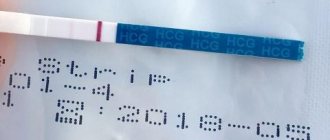Progesterone is a female hormone produced in the human body.
It influences the menstrual cycle, embryogenesis, pressure, sebum secretion and the functional ability of the prostate.
A progesterone test is indicated for the onset of gynecological diseases, planning pregnancy and in its first trimester.
Progesterone: what everyone needs to know?
An analysis of progesterone levels in women is a study that allows you to assess your health status and detect abnormalities. The results will make it clear whether hormonal adjustments or additional treatment are needed before pregnancy.
Progesterone is a special hormone, it is produced by the adrenal cortex and the corpus luteum. It is this that appears after ovulation in place of the dominant body. The corpus luteum dies if the mature egg is not fertilized, after which the menstrual cycle begins.
If conception has occurred, then the moment comes for the corpus luteum to work, which will produce an important hormone for it until the 16th week of pregnancy. Immediately after this, the placenta takes over this function.
Progesterone is a hormone that ensures the normal attachment and subsequent development of a fertilized egg to the internal cavity of the uterus. She will lose contractility and therefore will not be able to reject the embryo. The hormone is also needed to prepare the mammary gland for future feeding.
Testing is often necessary for women who are planning a pregnancy. The levels of the same hormone are also checked in cases where a woman cannot become pregnant for a long time.
Functions
This hormone is extremely necessary for the female body, as it performs the following functions:
- actively prepares the body for conception and subsequent pregnancy;
- participates in the development and growth of the fetus;
- helps stop menstruation during pregnancy;
- relaxes the muscles of the uterus, ensuring its increase in proportion to the growth of the embryo;
- stimulates the growth of mammary glands, preparing them for breastfeeding after the birth of a child;
- protects against spontaneous abortion.
Features level change
It is important for a woman to find out on what day of her cycle to take progesterone, since the level of this hormone is not constant. It will depend on the phase of the menstrual cycle and is marked by the following differences and changes:
- The first days of the cycle are the minimum;
- Growth up to ovulation and a little more after it;
- A sharp decline if pregnancy does not occur, which always ends with another menstruation.
When fertilization of the egg occurs, the level of progesterone does not decrease, but begins to gradually increase.
Explanation of progesterone analysis
First of all, it is necessary to focus on the fact that the results of a hormone test in the same person may be different.
Deviations will be insignificant, usually caused by different research methods and the degree of modernity of the equipment used.
| Progesterone noma | |
| In men | 0.28 – 1.22 ng/ml |
| In women of childbearing age | 0.15 - 25.6 ng / ml, everything will depend on the phase of the cycle |
| For girls under 18 years of age | 0.15-28 ng/ml |
| When taking COCs | 0.34 – 0.92 ng/ml |
| During menopause | 0.73 ng/ml |
| During the period of bearing a child | 11.2 – 422 ng/ml, everything will depend on the trimester |
Low progesterone
When progesterone levels decrease in the first trimester of pregnancy, there is a high risk of miscarriage, and sometimes there is impaired fetal development and post-term pregnancy.
The use of certain medications and inflammatory diseases of the genital organs in a chronic form can suppress the process of progesterone production.
Increased progesterone
An increase in the amount of the hormone in pregnant women can provoke:
- excessive weight gain;
- formation of stones in the gallbladder;
- disturbances in the functioning of the digestive tract, which will manifest itself in the form of constipation;
- flatulence.
If the amount of hormone increases, you can suspect:
- the presence of a neoplasm;
- malfunction of the adrenal glands;
- syndrome of impairment of all renal functions;
- menstrual irregularities;
- problems with the placenta.
Regardless of the situation, you need to see a doctor, undergo the necessary examinations and tests.
Why do you need to take it?
The body of a healthy woman should work according to a certain pattern. Before ovulation, progesterone levels steadily rise. From the moment of ovulation, the menstrual cycle begins for 10 days, after which everything repeats again.
The entire period from the moment of ovulation and conception, progesterone prepares the body for bearing and childbirth, for which the hormone is constantly produced in the corpus luteum.
It is important to understand that during the shortened second phase of the menstrual cycle, the endometrium does not fully undergo all the necessary changes, and therefore the successful onset of pregnancy and childbearing is a big question. Also, after conception, if the hormonal system does not work properly, spontaneous abortion may occur in the early stages.
That is why it is important to get tested for progesterone; if abnormalities are detected, you need to undergo a course of treatment, and then think about pregnancy. In this case, the chances of successful pregnancy and normal development of the fetus are significantly increased.
A referral for a laboratory examination of hormonal levels with explanations and explanations of when to take a progesterone test can be obtained from your doctor in the following cases:
- The need to establish the real cause of infertility and the inability to bear a child normally;
- Menstrual irregularities, especially if this condition occurs over a long period;
- Induced ovulation, which allows you to analyze the woman’s health status;
- Absence of menstruation not due to natural causes;
- The patient complains of various ailments relating to the genital organs;
- The need to conduct a comprehensive examination of a woman’s health status before conception.
It is recommended to find out from your doctor when to donate blood for progesterone. He will not only give recommendations, but also personal instructions regarding the choice of time for such an examination. To eliminate errors during the examination process, you should strictly adhere to the instructions.
How to bring progesterone levels back to normal
When the hormone level decreases, the following can be used:
- Subcutaneous or intramuscular administration of 1%, 2% or 2.5% progesterone. The procedure is carried out under the strict supervision of the attending physician in the second half of the cycle. It is forbidden to abruptly discontinue the drug, or to reduce or increase the dosage. This is explained by the fact that such actions can provoke hormonal imbalance in the female body.
- Oral administration of tablets. On the first line of popularity is such drugs as Duphaston. The positive point in this case is that it does not lead to adverse reactions.
- Oral or vaginal use of Utrozhestan. The downside is that taking the pills can cause dizziness.
What does the analysis show?
When deciding when to donate blood for progesterone to women, you should understand why such an analysis is necessary at all. Doctors take into account the health characteristics of their patient in order to write out a referral and send her for examination at the very time when the data obtained will be the most informative.
Half of all pathologies associated with gynecology are caused by hormones. Prolactin is not in last place on this list! Abnormalities are indicated by the failure of menstruation or bleeding to occur on time.
Finding out when to take prolactin is important for those women who are planning their pregnancy. It is important to make sure that the hormonal background is normal in order to be sure that the concentration of prolactin, FSH, and other hormones will allow the body to normally bear and give birth to a child.
The analysis allows us to determine the time of ovulation, when progesterone begins to actively increase, and the period itself receives a specific name - the luteal phase. During ovulation, hormone levels can increase 10 times! If the necessary jump is not detected, we can talk about the presence of pathological processes.
General indications for checking hormonal levels
Specialists refer the patient to this event for the following reasons:
- Irregular menstrual bleeding.
- Sudden, causeless weight loss or weight gain.
- Repeated miscarriages.
- Inability to conceive a child.
- Diseases of the mammary glands.
- Acne and acne.
- Excess body hair.
- Improper functioning of the kidneys.
When is it due?
You should still find out which day of the cycle to take progesterone from your doctor. During the consultation, the doctor examines the patient, and then decides on the need to conduct such tests and issue a referral. You should not make a decision on your own so as not to waste both time and energy.
At what day of the cycle is it important to donate blood to check progesterone levels? Often this analysis is prescribed in the third week after the start of the cycle. After receiving the tests, you should go to the doctor for an evaluation. It’s still not worth trying to decipher and interpret the result on your own. The average person often does not have enough knowledge to evaluate the evidence.
The most favorable period for carrying out diagnostic procedures is 21, 22, 23 days after the start of a new menstrual cycle. It is during this period that the data will be informative and it will be possible to understand the cause of infertility, untimely periods, poor health or uterine bleeding, pathologies of the thyroid gland, etc.
The accuracy of the obtained indicators and results will directly depend on many important factors. And if for a man it does not matter when to take progesterone, then for a woman it is important not to miss those 2-3 days from the moment the favorable time arrives. Sometimes doctors may recommend a different time for testing for a woman.
There are also other methods for studying the patient’s hormonal background, when the level of progesterone and a number of other hormones will be determined dynamically - at intervals specified by the doctor.
What do deviations from the norm indicate?
A progesterone level that is less than normal or higher than normal indicates certain dysfunctions of the body. After analyzing the results and conducting additional examinations, the doctor makes a diagnosis and prescribes treatment.
An increase in the amount of progesterone is typical for:
- absence of menstruation for a long time;
- formation of a corpus luteum cyst;
- uterine bleeding;
- pathologies of the placenta.
A decrease in the amount of the hormone may indicate:
- inflammation of the ovaries;
- failure of the periodicity of the menstrual cycle;
- pathological development of the fetus;
- violation of the corpus luteum;
- lack of ovulation.
Features of proper preparation
Venous blood is collected in laboratories. To ensure that the results are accurate and that no mistakes or errors are made, you should adhere to the following rules during the preparation process:
- Remember the exact date of the start of your last period in order to make correct calculations and clarify the time of taking the necessary analysis.
- Go to the laboratory on an empty stomach - it is forbidden to eat any food before donating blood for progesterone. Only water is allowed. You cannot drink tea or coffee, drinks or juices.
- Spicy, fatty, excessively salty, pickled foods should be avoided the day before donating blood.
- Serious physical activity should be avoided during the day. It's better to skip going to the gym once.
- It is important to appear for a prolactin test strictly between the 19th and 23rd days. It is best to discuss the specific time with your doctor.
- If a woman is taking antibiotics or hormonal pills, the possibility of discontinuing them for a while should be discussed with her doctor. This point should be clarified at the appointment to avoid distortion of the results. It is especially important to clarify this issue if the patient is prescribed a serious therapeutic program.
For a couple of days, it is recommended to protect yourself from stressful situations, since they can seriously affect the overall hormonal balance. It is not always possible to follow such a recommendation, but it is important to at least reconsider your attitude towards events.
How to treat hormonal imbalance
Treatment for failure of hormone production can be carried out in two ways: with the help of traditional medicine and medications. The choice of treatment method is always up to the woman, but it should be understood that it is almost impossible to cure serious hormonal disorders with folk remedies.
Treatment of imbalance with medications is prescribed by a doctor after tests. You should also not take hormonal medications without a doctor’s prescription, as this can lead to serious health problems.
If it has been determined that the cause of the disorder is a tumor, then the doctor will consider the possibility of surgical intervention. In the absence of serious deviations from the norm, its level can be corrected by starting to eat right and leading a healthy lifestyle.
Chicken meat, nuts, olives and physical activity will help increase testosterone. The concentration of the hormone can be reduced by reducing body weight. Often, to increase the effectiveness of all of these measures, it is necessary to give up alcohol and smoking. If it is not possible to achieve the desired effect in this way, you must consult a doctor to prescribe special medications.
Hormonal levels require increased attention. But if you are faced with a problem such as hormonal imbalance, do not get upset or ignore the problem. Modern diagnostic and treatment methods will quickly help restore your health to normal and restore self-confidence. And to prevent such conditions, good nutrition and physical activity will be sufficient.
Impact on the result
It is important to ask your doctor not only when to take a progesterone test, but also to clarify the possible impact on the result. Negatively affects it:
- Sexual contact that occurred immediately before the test. Testosterone in the blood increases, which also affects progesterone. Data after intimate intercourse may be distorted.
- Medications the patient is taking. In some cases, it is reasonable to temporarily stop using medications.
- Various pathological processes in the thyroid gland. Often diagnosis occurs together with the donation of TSH and T4 hormones.
- Infectious diseases. If your body temperature rises during testing, you should not conduct research. It is advisable to postpone them to the next month.
- Personal characteristics of the body, including stress and depression.
- Alcohol consumed the night before the test. It inhibits the functionality of the endocrine system, and therefore the results may be distorted.
- Diseases of the endocrine system, including adrenal dysfunction.
Other factors may also affect test results. The cause of deviations or distortion of data should be determined individually in each case, but most often the doctor prescribes a repeat study. It can also be carried out dynamically.
Who is contraindicated for progesterone treatment?
Unfortunately, not everyone benefits equally from increased concentrations of this hormone in the blood. In addition to the adverse reactions that progesterone (as a drug) can cause, it has a negative effect on those who are sick:
- Breast cancer, genital tumors.
- Hepatitis or other liver diseases.
- Bronchitis.
- Heart diseases.
- Diabetes mellitus, renal failure.
People prone to thrombosis should not take progesterone.
Progesterone preparations should only be prescribed by a doctor. Self-medication is prohibited.
How to take the test correctly?
Traditionally, the research process allows us to understand the cause of the development of pathologies and act on it. However, it is not always possible to correctly calculate the exact time of ovulation. Women with irregular menstrual cycles face a similar problem.
If a woman's periods are irregular, there is no certainty that ovulation will occur exactly on the 21st day. This means that the results obtained may not be accurate. To find out when it is important and when you should donate blood for progesterone in this case, you should contact your gynecologist. It is likely that several studies will have to be conducted.
Hormone level correction
Progesterone can be corrected with medication. Its concentration in the blood can be either increased or decreased. But such treatment tactics are not always justified, since they do not affect the cause of the pathology. High or low progesterone is often a consequence of acute or chronic illness. The doctor must find out the true reason for the deviation of indicators from the norm and make a diagnosis.
During the treatment of a disease that has caused a hormonal imbalance, drug therapy may be prescribed to correct progesterone.
Established norm indicators
To interpret the results obtained and identify pathological processes, it is recommended to adhere to the following indicators to determine the norm:
- In the period before ovulation – 0.3–2.25 nmol/l.
- During the period of ovulation – 0.46–9.4 nmol/l.
- After the ovulation period – 7–56.5 nmol/l.
A completely different picture is observed with the onset of pregnancy. In the first trimester, the values shift to a limit of 8.9–468 nmol/l, in the second – to 303 nmol/l, in the third trimester – to 771 nmol/l.
The doctor will interpret deviations from these norms taking into account data obtained from other examinations of the woman’s body. There is a possibility that an error was made in the laboratory, in which case a retake of the tests is ordered. However, there is another possibility - the development of various pathologies, including amenorrhea and corpus luteum cysts. With deviations, bleeding and inflammatory processes of the pelvic organs are possible.
Methods for normalizing an indicator
If progesterone increases above the norm, there are 3 methods to reduce it. This is a medication method, diet and traditional methods of treatment. The doctor will prescribe Clomiphene, Tamoxifen, Mifepristone or another drug. But first, a pregnancy test is done.
It must be remembered that if the content of a substance deviates from the norm, it is necessary to determine its causes. To do this, the doctor may refer you for additional examination. First, find out if you are pregnant. The drugs should not be taken until additional data, test results and a doctor’s advice on their use are obtained. Better to play it safe. Removal of the adrenal tumor or other treatment may be necessary.
The second way is to follow a diet. Progesterone increases when protein foods appear in the diet. These are meat, dairy products, nuts and so on. If you exclude these types of food from the menu, progesterone will decrease. But this will be a temporary decrease, since it is impossible not to eat dairy products and meat all your life.
Finally - traditional methods. To reduce the hormone, drink a decoction of rowan berries, clove flowers in a decoction, and boron uterus. These herbs are sold in pharmacies. The packaging indicates how to prepare them and how much to drink at a time.
It must be remembered that before starting treatment, you must donate venous blood for the substance progesterone and undergo an examination prescribed by the doctor. Traditional methods of bringing the indicator back to normal should also be recommended by a specialist after a pregnancy test.
If the hormone level is reduced, the doctor will prescribe hormonal medications. The most famous progesterone analogues are Duphaston and Utrozhestan. Medicines are available in different forms. More often, oral tablets, vaginal suppositories, or injection solutions are prescribed. Injections are given intramuscularly or subcutaneously. Duphaston is artificially obtained progesterone, and Utrozhestan is natural. Duphaston is more preferable because it produces fewer side effects.
Only a specialist can prescribe a particular drug if there are no contraindications. Usually women turn to a gynecologist - endocrinologist.
Preparatory recommendations
For the analysis to give the most accurate results, the patient must:
- Avoid eating 12 hours before the procedure.
- Do not consume alcohol or nicotine three days before the event.
- Visit the laboratory in the morning and be calm.
- Do not drink water, brush your teeth or chew gum.
- Avoid physical and mental stress.
- Submit the material on the correct day of menstruation.
- Do not carry out the procedure if there are inflammatory processes in the body.
- Do not take pills ten days before the procedure.
Note! The timing of taking medications must be discussed with your doctor.











